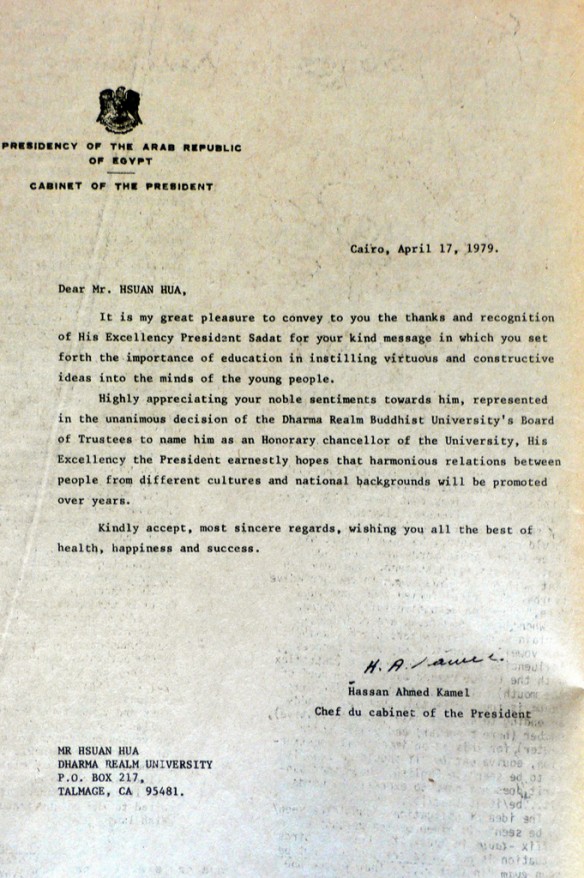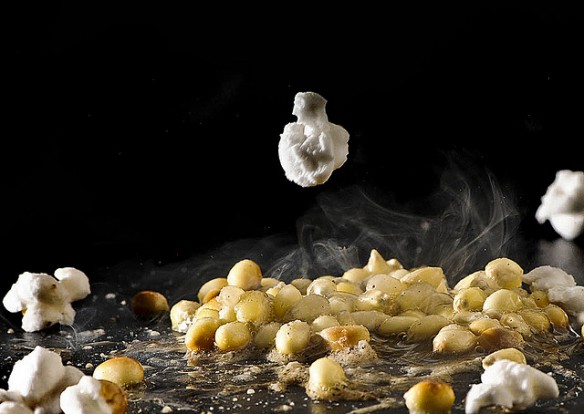
As a newcomer to the City of Ten Thousand Buddhas (CTTB), it’s pretty humbling to realize the endless depths of Buddhism– all the various concepts, practices, sutras, liturgies, people, and stories that have unfurled over centuries. In a couple weeks, the entire city will pause to spend an entire week cultivating compassion as emulated by Guan Yin Bodhisattva, the bodhisattva of Great Compassion. This year, beginners to Buddhism have the opportunity to join this retreat with guidance from DRBU instructors and staff. [Learn more]

The New Yorker magazine has a very insightful article on psychological studies about kids and self-control (It’s long, but worth a read). It illustrates a lot of different, subtle aspects of Patience. The original 1960s study tempted 4-year old kids with snacks placed right in front of them, where they are rewarded with extra snacks if they were able to wait 15 minutes.
Most kids didn’t last very long, but a small group of kids were able to delay their gratification. And the researcher started correlating Patience with increased possibilities.
“Young kids are pure id,” Mischel says. “They start off unable to wait for anything—whatever they want they need. But then, as I watched my own kids, I marvelled at how they gradually learned how to delay and how that made so many other things possible.”
After further observation, the researcher realized that self-control came from “strategic allocation of attention” and not sheer willpower. The successful kids avoid thinking about the snacks by deliberately placing their attention somewhere else, for example, doing a familiar activity and forgetting about the snacks. Read More …
I was going through some old materials in the archive when I came across a reproduction of this letter:
The letter was written by Hassan Ahmed Kamel in 1979, then chief of cabinet of the late President Muhammad Anwar El Sadat of Egypt, and it was addressed to the late Ch’an Master Hsuan Hua, the founder of Dharma Realm Buddhist University. On behalf of president Sadat, Mr. Kamel graciously accepted the unanimous decision of the university’s board of trustees’ to name President Sadat an Honorary chancellor of the university.

President Anwar El Sadat's Letter to DRBU
In the letter, Mr. Kamel also convey President Sadat’s recognition the importance of education in “instilling virtue and constructive ideas into the mind of young people” that Master Hua must have set forth in the University’s original letter. At the end of this short letter, Mr. Kamel wrote that the president hoped that “harmonious relations between people from different cultures and national backgrounds can be promoted over years”. Read More …

When I was a kid, I loved to hide. Playing in my bedroom, I’d sneakily dive under the covers and sit there, a smiling, smug child, thinking I was invisible.
“Audrey’s hiding again,” my older sister would proclaim, in a rolling-her-eyes type tone.
“That’s okay. Let her hide,” my mother would respond, allowing me to remain unseen.
Today, this memory resurfaced in my mind.
After three weeks at the City of Ten Thousand Buddhas (CTTB), I’ve gone from a week of stillness (completely immersed in the Chan Meditation Session, oblivious to the world outside me) to a week of wide-eyed wonder at starting something new, to a week of uncertainty and emotional highs and lows. Read More …
 So what did Buddha have to say about our modern experience? Our fundamental problem is our crowning achievement. We have the potential for a radical, exciting freedom; yet, at the same time, we fear the responsibility. We vacillate from ecstasy and fear, openness and disappointment, feeling full of possibilities, and at the same time, recognize profound limitations. We feel that we should be enjoying a full life of meaning, while constantly experiencing a sense of anxiety and impermanence. We are choosing between the extremes of cynicism and fundamentalism, worry and authority.
So what did Buddha have to say about our modern experience? Our fundamental problem is our crowning achievement. We have the potential for a radical, exciting freedom; yet, at the same time, we fear the responsibility. We vacillate from ecstasy and fear, openness and disappointment, feeling full of possibilities, and at the same time, recognize profound limitations. We feel that we should be enjoying a full life of meaning, while constantly experiencing a sense of anxiety and impermanence. We are choosing between the extremes of cynicism and fundamentalism, worry and authority.
The Buddha recognized our human potential for radical freedom, while at the same time, pointed out the psychological process that grounded and conditioned that process. We have the potential for infinite freedom in each moment of experience–only realized in the context of possibilities–which are available to our imagination based on past choices. The present choices, in turn, determine the future construct in which we experience ourselves. We each determine our experiential content based on our current choices.
The current malaise is exasperated by our lack of awareness of the choices we currently have and a sense of consequences and responsibilities that result from the choices we make, consciously or unconsciously. We seem lost in the overwhelming intensity of sense experiences and the multitasking that overwhelms our conscious awareness, which is the foundation and seat of all our fluidity of experience. Without stopping the input and flow long enough to seize the conscious awareness–the source of meaningful interpretation of experience–we become lost in an ongoing flow that seems to be determined by forces beyond our conscious control. Read More …
The Buddha urged his students to focus on their experiences, rather than trying to figure out the ultimate reason for their existence. “dharmas” are irreducible and basic units of our experience. Momentary and discrete, dharmas appear to be the objects of our cognitive awareness, but they also co-arise with the appearance of our cognitive awareness itself.
To illustrate this relationship, reflect on these points: As stimuli impress upon our senses, our cognitive awareness arises out of a discernment, or distinction of differences, in the stimuli. Read More …

 SHARE
SHARE EMAIL
EMAIL COMMENT0 comments
COMMENT0 comments 




